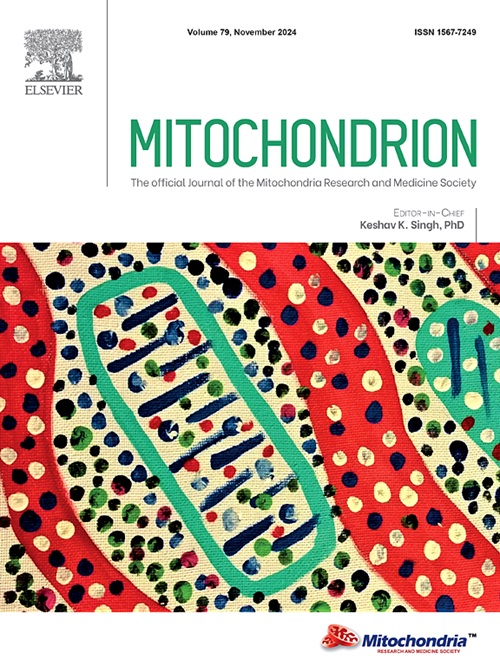Mitochondrial health, prenatal distress, and gestational age: investigation of cf-mtDNA and GDF15 in two pregnancy studies from the USA and Turkey
IF 4.5
3区 生物学
Q2 CELL BIOLOGY
引用次数: 0
Abstract
Background
Pregnancy outcomes are influenced by maternal distress but the pathways underlying these effects are still unknown. Mitochondria, crucial for energy production and stress adaptation, may link psychosocial stress to its biological effects, especially during pregnancy when energy demands significantly increase. This study explores two mitochondrial markers-circulating cell-free mitochondrial DNA (cf-mtDNA) and Growth Differentiation Factor-15 (GDF15)-as potential mitochondrial health indicators linking maternal distress to pregnancy outcomes in two longitudinal studies from the USA and Turkey.
Methods
We analyzed biological, demographic, and psychological data from women in two pregnancy studies: EPI (N = 187, USA) and BABIP (N = 198, Turkey). Data were collected at multiple timepoints during the perinatal period, including late 2nd and 3rd trimester, with EPI also including additional data at early 2nd trimester and 4–14 months postpartum. Prenatal maternal psychological distress was measured as perceived stress, anxiety, and depressive symptoms. Plasma cf-mtDNA and GDF15 levels were assessed using qPCR and ELISA, respectively. Statistical analyses included Wilcoxon signed-rank tests, Spearman correlations, and Mann-Whitney tests.
Results
Plasma cf-mtDNA levels did not significantly vary across pregnancy, while plasma GDF15 levels increased from early to late pregnancy and decreased postpartum. Late 2nd trimester plasma GDF15 was negatively correlated with pre-pregnancy BMI (p = 0.035) and gestational age (p = 0.0048) at birth. Early 2nd trimester maternal distress was associated with lower cf-mtDNA (all p-values < 0.05) and a trend for lower GDF15. Higher pre-pregnancy BMI and late-pregnancy maternal distress were linked to smaller postpartum GDF15 declines in EPI (all p-values < 0.05).
Conclusions
This study identified distinct patterns of plasma cf-mtDNA and GDF15 levels during the perinatal period across studies from two countries, linking these mitochondrial markers to maternal distress and pregnancy outcomes.
线粒体健康、产前窘迫和胎龄:美国和土耳其两项妊娠研究中cf-mtDNA和GDF15的调查
背景:妊娠结局受到母亲痛苦的影响,但这些影响背后的途径尚不清楚。线粒体对能量产生和压力适应至关重要,可能将社会心理压力与其生物效应联系起来,特别是在能量需求显著增加的怀孕期间。本研究在美国和土耳其的两项纵向研究中探讨了两种线粒体标记物——循环无细胞线粒体DNA (cf-mtDNA)和生长分化因子-15 (GDF15)——作为潜在的线粒体健康指标,将母亲的痛苦与妊娠结局联系起来。方法:我们分析了两项妊娠研究中妇女的生物学、人口学和心理数据:EPI (N = 187,美国)和BABIP (N = 198,土耳其)。在围产期的多个时间点收集数据,包括妊娠晚期和妊娠晚期,EPI还包括妊娠早期和产后4-14个月 的额外数据。产前母亲的心理困扰被测量为感知压力、焦虑和抑郁症状。分别采用qPCR和ELISA检测血浆cf-mtDNA和GDF15水平。统计分析包括Wilcoxon sign -rank检验、Spearman相关性检验和Mann-Whitney检验。结果:血浆cf-mtDNA水平在妊娠期间无显著差异,而血浆GDF15水平从妊娠早期到晚期升高,产后降低。妊娠晚期血浆GDF15与孕前BMI (p = 0.035)和出生时胎龄(p = 0.0048)呈负相关。结论:本研究在两个国家的研究中发现了围产期血浆中cf-mtDNA和GDF15水平的不同模式,将这些线粒体标志物与孕产妇痛苦和妊娠结局联系起来。
本文章由计算机程序翻译,如有差异,请以英文原文为准。
求助全文
约1分钟内获得全文
求助全文
来源期刊

Mitochondrion
生物-细胞生物学
CiteScore
9.40
自引率
4.50%
发文量
86
审稿时长
13.6 weeks
期刊介绍:
Mitochondrion is a definitive, high profile, peer-reviewed international research journal. The scope of Mitochondrion is broad, reporting on basic science of mitochondria from all organisms and from basic research to pathology and clinical aspects of mitochondrial diseases. The journal welcomes original contributions from investigators working in diverse sub-disciplines such as evolution, biophysics, biochemistry, molecular and cell biology, genetics, pharmacology, toxicology, forensic science, programmed cell death, aging, cancer and clinical features of mitochondrial diseases.
 求助内容:
求助内容: 应助结果提醒方式:
应助结果提醒方式:


